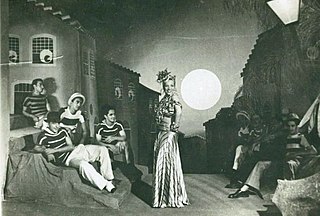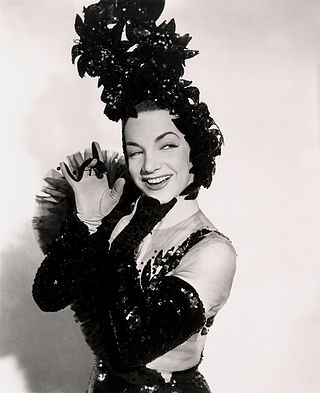
Maria do Carmo Miranda da Cunha, known professionally as Carmen Miranda, was a Portuguese-born Brazilian samba singer, dancer, Broadway actress and film star who was active from the late 1920s onwards. Nicknamed "The Brazilian Bombshell", Miranda was known for her signature fruit hat outfit that she wore in her American films. As a young woman, she designed hats in a boutique before making her first recordings with composer Josué de Barros in 1929. Miranda's 1930 recording of "Taí ", written by Joubert de Carvalho, catapulted her to stardom in Brazil as the foremost interpreter of samba.
Tropicália, also known as Tropicalismo, was a Brazilian artistic movement that arose in the late 1960s. It was characterized by the amalgamation of Brazilian genres—notably the union of the popular and the avant-garde, as well as the melding of Brazilian tradition and foreign traditions and styles. Today, Tropicália is chiefly associated with the musical faction of the movement, which merged Brazilian and African rhythms with British and American psychedelia and pop rock. The movement also included works of film, theatre, and poetry.

The Good Neighbor policy was the foreign policy of the administration of United States President Franklin Roosevelt towards Latin America. Although the policy was implemented by the Roosevelt administration, President Woodrow Wilson had previously used the term, but subsequently went on to justify U.S. involvement in the Mexican Revolution and occupation of Haiti. Senator Henry Clay had coined the term Good Neighbor in the previous century. President Herbert Hoover turned against interventionism and developed policies that Roosevelt perfected.

Aurora Miranda da Cunha Richaid was a Brazilian singer and actress. She began her career at the age of 18 in 1933. Miranda appeared in several films, including The Three Caballeros, where she danced with Donald Duck and José Carioca, singing the song, "Os Quindins de Yayá". Her sisters were Carmen Miranda and Cecilia Miranda.

Down Argentine Way is a 1940 American musical film made in Technicolor by Twentieth Century Fox. It made a star of Betty Grable in her first leading role for the studio although she had already appeared in 31 films, and it introduced American audiences to Carmen Miranda. It also starred Don Ameche, The Nicholas Brothers, Charlotte Greenwood, and J. Carrol Naish.

A Date with Judy is a 1948 American comedy musical film starring Wallace Beery, Jane Powell, and Elizabeth Taylor. Directed by Richard Thorpe, the film was based on the radio series of the same name.

Copacabana is a 1947 American musical comedy film directed by Alfred E. Green starring Carmen Miranda and Groucho Marx.

Week-End in Havana is a 1941 20th Century Fox Technicolor musical film directed by Walter Lang and starring Alice Faye and Carmen Miranda. It was the second of three pictures the two stars made together and the second Faye film to have a Latin-American theme, typical of Fox musicals of the early 1940s. Faye was pregnant during filming.

A fruit hat is a festive and colorful hat type popularized by Carmen Miranda and associated with warm locales. This type of hat has been worn by fashionistas, in films, by comic strip characters, and for Halloween. The fruit used tends to sit on the top or around the head, and varies in type, e.g. bananas, berries, cherries, pineapples.

Dreams of Rio is a radio drama, produced by the ZBS Foundation. It is the fifth of the Jack Flanders adventure series, and combines elements of American culture and Old-time radio with themes of lost cities, jungle exploration and shamanism. It immediately precedes but is not part of the "Travels with Jack" adventures, each of which is entitled Dreams of ...

Carmen Miranda: Bananas is My Business is a 1995 documentary filmed and directed by Helena Solberg. This documentary chronicles the life and career of Carmen Miranda, Hollywood's symbol of Latin American spirit in the 1940s. The documentary tells her life story in a series of stages, beginning with her roots and rise to stardom in her home country of Brazil, her transition and development as a performer in the United States, first on Broadway in New York City, then in the film industry after she signed with 20th Century Fox in Los Angeles, and her later years in life, before her death and her return to Brazil. Helena Solberg uses two different film styles, biography and directorial reverie, in which Solberg uses actor Erick Barretos to “resurrect Carmen Miranda in several fantasy sequences. Helena Solberg's attitudes shift throughout the documentary from awe-struck child to empathetic and forgiving Brazilian woman, which she uses to represent the contradictory subplots of Carmen Miranda's life. Alongside the fantasy like resurrection of Miranda, Solberg accompanies her documentary with multiple interviews with Carmen Miranda's friends and family, like her sister, her first boyfriend, the guitarist Laurindo Almeida, samba song-writer Synval Silva, Cesar Romero, and Alice Faye.

Carmen Miranda Museum, located in the Parque Brigadeiro Eduardo Gomes, is a museum established in homage to singer and actress Carmen Miranda and open to the public since 1976. The museum was officially opened on the 21st anniversary of her death.

O que é que a baiana tem? is a song composed by Dorival Caymmi in 1939 and recorded by Carmen Miranda.

Banana da Terra is a 1939 Brazilian musical film directed by Ruy Costa and written by Braguinha and Mário Lago. The film stars Carmen Miranda, Dircinha Batista and Aloysio de Oliveira. It was Miranda's last film in Brazil, before she moved to Hollywood.

"No Tabuleiro da Baiana" is a samba written in 1936 by Ary Barroso and recorded by Carmen Miranda.
Rebola, Bola is a song written by Aloysio de Oliveira, Nestor Amaral and Brant Horta, and recorded by Carmen Miranda in 1941 for the film Week-End in Havana, in which Miranda co-starred.

Aloísio or Aloysio de Oliveira, also known as Louis Oliveira, was a Brazilian record producer, singer, actor and composer. A key figure in the internationalization of Brazilian popular music, he contributed to Carmen Miranda's career abroad with his own musical ensemble: Bando da Lua, which he founded in 1929 with Hélio Jordão Pereira, Afonso Osório, Stênio Osório, Armando Osório, Osvaldo Éboli, Ivo Astolfi, Diego Astolfi and some other cousins of the latter for a total of 12 people. With the death of Miranda in August 1955 the group disbanded. Back in Brazil, Aloísio directed the command of Odeon Records, then created his own record label: the Elenco, producing dozens of discs and launching important names of bossa nova as Tom Jobim.

Carmen - Uma Biografia is a 2005 biographical book written by Ruy Castro. Published in 2005 by Companhia das Letras, the book treats on the main events Carmen Miranda's life, from his rise as a radio singer in the 1930s in Brazil, through the acme period of his career as a Hollywood actress and singer of Broadway to the process of decline and death.

Cecilia Miranda de Carvalho was a Brazilian singer. She was Carmen Miranda and Aurora Miranda's sister.

This is a complete filmography of Carmen Miranda, a Portuguese-Brazilian singer, actress, and dancer.


















